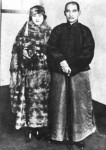Song Qingling: the Lady Who Loves China
Song Qingling (January 27, 1892 – May 29, 1981) was one of the Song sisters—three sisters whose husbands were amongst China’s most significant political figures of the early 20th century. Also known as Madame Sun Yat-sen, she was described as the “one who loved China”. Her Christian name was Rosamond.
sisters—three sisters whose husbands were amongst China’s most significant political figures of the early 20th century. Also known as Madame Sun Yat-sen, she was described as the “one who loved China”. Her Christian name was Rosamond.
She was born to the wealthy businessman and missionary Charlie Song in Kunshan, Jiangsu, attended Motyeire School for Girls in Shanghai, and graduated from Wesleyan College in Macon, Georgia, United States.
She married Sun Yat-sen in Japan on October 25, 1915 after he divorced Lu Muzhen. Qingling’s parents greatly opposed the marriage, as Dr. Sun was 26 years her senior. After Sun’s death in 1925, she was elected to the Kuomintang (KMT) Central Executive Committee in 1926. However, she exiled herself to Moscow after the expulsion of the Communists from the KMT in 1927.
Although she reconciled with the KMT during the Sino-Japanese War (1937-1945), she sided with the Communists in the Chinese Civil War. She did not join the party but rather was part of the united front heading up the Revolutionary Committee of the Kuomintang.
Song Qingling accompanied Sun Yat-sen in 1924 on his final trip to Beijing in 1939. She founded the China Welfare Institute (former China Defense League) in Hong Kong.
She set up the magazine China Today (former China Reconstructs) in 1949 with the help of Israel Epstein. This magazine is published monthly in 6 languages (Chinese, English, French, German, Arabic and Spanish).
After the establishment of the People’s Republic of China, she became the Vice Chair of the People’s Republic of China (now translated as “Vice President”), Head of the Sino-Soviet Friendship Association and Honorary President of the All-China Women’s Federation. In 1951 she was awarded the Stalin Peace Prize, and in 1953 a collection of her writings, Struggle for New China, was published. From 1968 to 1972 she acted jointly with Dong Biwu as head of state.
According to Jung Chang’s and Jon Halliday’s biography of Song Qingling, Madame Sun’s home was one of the few places if not the only place to offer macaroni and cheese in Communist China during its isolation from the 1950s to 70s.
On May 16, 1981, two weeks before her death, she was admitted to the Communist Party and was named Honorary President of the People’s Republic of China.
Unlike her younger sister Song Meiling, who sided with her husband Chiang Kai-shek and fled to Taiwan, Song Qingling is greatly revered in mainland China.